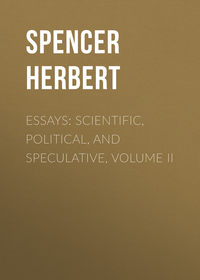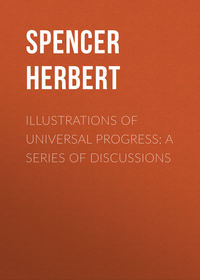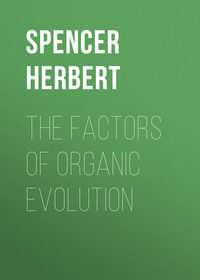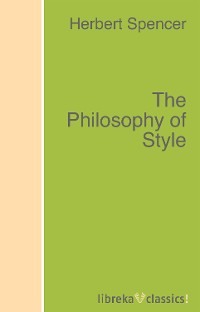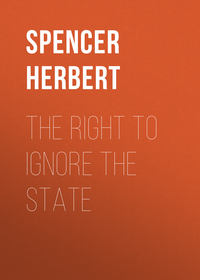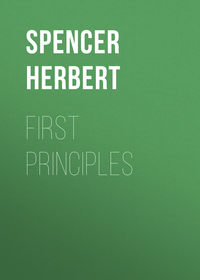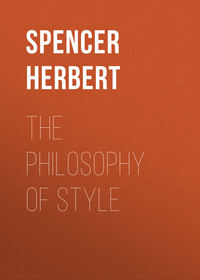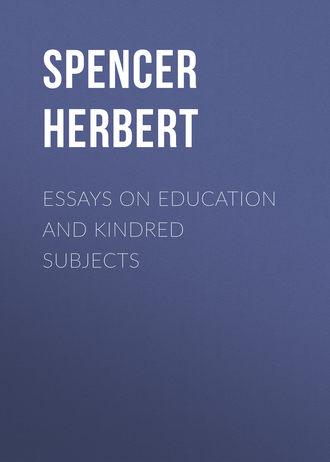 полная версия
полная версияEssays on Education and Kindred Subjects
2. The development of the mind, as all other development, is an advance from the indefinite to the definite. In common with the rest of the organism, the brain reaches its finished structure only at maturity; and in proportion as its structure is unfinished, its actions are wanting in precision. Hence like the first movements and the first attempts at speech, the first perceptions and thoughts are extremely vague. As from a rudimentary eye, discerning only the difference between light and darkness, the progress is to an eye that distinguishes kinds and gradations of colour, and details of form, with the greatest exactness; so, the intellect as a whole and in each faculty, beginning with the rudest discriminations among objects and actions, advances towards discriminations of increasing nicety and distinctness. To this general law our educational course and methods must conform. It is not practicable, nor would it be desirable if practicable, to put precise ideas into the undeveloped mind. We may indeed at an early age communicate the verbal forms in which such ideas are wrapped up; and teachers, who habitually do this, suppose that when the verbal forms have been correctly learnt, the ideas which should fill them have been acquired. But a brief cross-examination of the pupil proves the contrary. It turns out either that the words have been committed to memory with little or no thought about their meaning, or else that the perception of their meaning which has been gained is a very cloudy one. Only as the multiplication of experiences gives materials for definite conceptions – only as observation year by year discloses the less conspicuous attributes which distinguish things and processes previously confounded together – only as each class of co-existences and sequences becomes familiar through the recurrence of cases coming under it – only as the various classes of relations get accurately marked off from each other by mutual limitation, can the exact definitions of advanced knowledge become truly comprehensible. Thus in education we must be content to set out with crude notions. These we must aim to make gradually clearer by facilitating the acquisition of experiences such as will correct, first their greatest errors, and afterwards their successively less marked errors. And the scientific formulæ must be given only as fast as the conceptions are perfected.
3. To say that our lessons ought to start from the concrete and end in the abstract, may be considered as in part a repetition of the first of the foregoing principles. Nevertheless it is a maxim that must be stated: if with no other view, then with the view of showing in certain cases what are truly the simple and the complex. For unfortunately there has been much misunderstanding on this point. General formulas which men have devised to express groups of details, and which have severally simplified their conceptions by uniting many facts into one fact, they have supposed must simplify the conceptions of a child also. They have forgotten that a generalisation is simple only in comparison with the whole mass of particular truths it comprehends – that it is more complex than any one of these truths taken singly – that only after many of these single truths have been acquired does the generalisation ease the memory and help the reason – and that to a mind not possessing these single truths it is necessarily a mystery. Thus confounding two kinds of simplification, teachers have constantly erred by setting out with "first principles": a proceeding essentially, though not apparently, at variance with the primary rule; which implies that the mind should be introduced to principles through the medium of examples, and so should be led from the particular to the general – from the concrete to the abstract.
4. The education of the child must accord both in mode and arrangement with the education of mankind, considered historically. In other words, the genesis of knowledge in the individual must follow the same course as the genesis of knowledge in the race. In strictness, this principle may be considered as already expressed by implication; since both, being processes of evolution, must conform to those same general laws of evolution above insisted on, and must therefore agree with each other. Nevertheless this particular parallelism is of value for the specific guidance it affords. To M. Comte we believe society owes the enunciation of it; and we may accept this item of his philosophy without at all committing ourselves to the rest. This doctrine may be upheld by two reasons, quite independent of any abstract theory; and either of them sufficient to establish it. One is deducible from the law of hereditary transmission as considered in its wider consequences. For if it be true that men exhibit likeness to ancestry, both in aspect and character – if it be true that certain mental manifestations, as insanity, occur in successive members of the same family at the same age – if, passing from individual cases in which the traits of many dead ancestors mixing with those of a few living ones greatly obscure the law, we turn to national types, and remark how the contrasts between them are persistent from age to age – if we remember that these respective types came from a common stock, and that hence the present marked differences between them must have arisen from the action of modifying circumstances upon successive generations who severally transmitted the accumulated effects to their descendants – if we find the differences to be now organic, so that a French child grows into a French man even when brought up among strangers – and if the general fact thus illustrated is true of the whole nature, intellect inclusive; then it follows that if there be an order in which the human race has mastered its various kinds of knowledge, there will arise in every child an aptitude to acquire these kinds of knowledge in the same order. So that even were the order intrinsically indifferent, it would facilitate education to lead the individual mind through the steps traversed by the general mind. But the order is not intrinsically indifferent; and hence the fundamental reason why education should be a repetition of civilisation in little. It is provable both that the historical sequence was, in its main outlines, a necessary one; and that the causes which determined it apply to the child as to the race. Not to specify these causes in detail, it will suffice here to point out that as the mind of humanity placed in the midst of phenomena and striving to comprehend them, has, after endless comparisons, speculations, experiments, and theories, reached its present knowledge of each subject by a specific route; it may rationally be inferred that the relationship between mind and phenomena is such as to prevent this knowledge from being reached by any other route; and that as each child's mind stands in this same relationship to phenomena, they can be accessible to it only through the same route. Hence in deciding upon the right method of education, an inquiry into the method of civilisation will help to guide us.
5. One of the conclusions to which such an inquiry leads, is, that in each branch of instruction we should proceed from the empirical to the rational. During human progress, every science is evolved out of its corresponding art. It results from the necessity we are under, both individually and as a race, of reaching the abstract by way of the concrete, that there must be practice and an accruing experience with its empirical generalisation, before there can be science. Science is organised knowledge; and before knowledge can be organised, some of it must be possessed. Every study, therefore, should have a purely experimental introduction; and only after an ample fund of observations has been accumulated, should reasoning begin. As illustrative applications of this rule, we may instance the modern course of placing grammar, not before language, but after it; or the ordinary custom of prefacing perspective by practical drawing. By and by further applications of it will be indicated.
6. A second corollary from the foregoing general principle, and one which cannot be too strenuously insisted on, is, that in education the process of self-development should be encouraged to the uttermost. Children should be led to make their own investigations, and to draw their own inferences. They should be told as little as possible, and induced to discover as much as possible. Humanity has progressed solely by self-instruction; and that to achieve the best results, each mind must progress somewhat after the same fashion, is continually proved by the marked success of self-made men. Those who have been brought up under the ordinary school-drill, and have carried away with them the idea that education is practicable only in that style, will think it hopeless to make children their own teachers. If, however, they will consider that the all-important knowledge of surrounding objects which a child gets in its early years is got without help – if they will remember that the child is self-taught in the use of its mother tongue – if they will estimate the amount of that experience of life, that out-of-school wisdom, which every boy gathers for himself – if they will mark the unusual intelligence of the uncared-for London gamin, as shown in whatever directions his faculties have been tasked – if, further, they will think how many minds have struggled up unaided, not only through the mysteries of our irrationally-planned curriculum, but through hosts of other obstacles besides; they will find it a not unreasonable conclusion that if the subjects be put before him in right order and right form, any pupil of ordinary capacity will surmount his successive difficulties with but little assistance. Who indeed can watch the ceaseless observation, and inquiry, and inference going on in a child's mind, or listen to its acute remarks on matters within the range of its faculties, without perceiving that these powers it manifests, if brought to bear systematically upon studies within the same range, would readily master them without help? This need for perpetual telling results from our stupidity, not from the child's. We drag it away from the facts in which it is interested, and which it is actively assimilating of itself. We put before it facts far too complex for it to understand; and therefore distasteful to it. Finding that it will not voluntarily acquire these facts, we thrust them into its mind by force of threats and punishment. By thus denying the knowledge it craves, and cramming it with knowledge it cannot digest, we produce a morbid state of its faculties; and a consequent disgust for knowledge in general. And when, as a result partly of the stolid indolence we have brought on, and partly of still-continued unfitness in its studies, the child can understand nothing without explanation, and becomes a mere passive recipient of our instruction, we infer that education must necessarily be carried on thus. Having by our method induced helplessness, we make the helplessness a reason for our method. Clearly then, the experience of pedagogues cannot rationally be quoted against the system we are advocating. And whoever sees this, will see that we may safely follow the discipline of Nature throughout – may, by a skilful ministration, make the mind as self-developing in its later stages as it is in its earlier ones; and that only by doing this can we produce the highest power and activity.
7. As a final test by which to judge any plan of culture, should come the question, – Does it create a pleasurable excitement in the pupils? When in doubt whether a particular mode or arrangement is or is not more in harmony with the foregoing principles than some other, we may safely abide by this criterion. Even when, as considered theoretically, the proposed course seems the best, yet if it produces no interest, or less interest than some other course, we should relinquish it; for a child's intellectual instincts are more trustworthy than our reasonings. In respect to the knowing-faculties, we may confidently trust in the general law, that under normal conditions, healthful action is pleasurable, while action which gives pain is not healthful. Though at present very incompletely conformed to by the emotional nature, yet by the intellectual nature, or at least by those parts of it which the child exhibits, this law is almost wholly conformed to. The repugnances to this and that study which vex the ordinary teacher, are not innate, but result from his unwise system. Fellenberg says, "Experience has taught me that indolence in young persons is so directly opposite to their natural disposition to activity, that unless it is the consequence of bad education, it is almost invariably connected with some constitutional defect." And the spontaneous activity to which children are thus prone, is simply the pursuit of those pleasures which the healthful exercise of the faculties gives. It is true that some of the higher mental powers, as yet but little developed in the race, and congenitally possessed in any considerable degree only by the most advanced, are indisposed to the amount of exertion required of them. But these, in virtue of their very complexity, will, in a normal course of culture, come last into exercise; and will therefore have no demands made on them until the pupil has arrived at an age when ulterior motives can be brought into play, and an indirect pleasure made to counterbalance a direct displeasure. With all faculties lower than these, however, the immediate gratification consequent on activity, is the normal stimulus; and under good management the only needful stimulus. When we have to fall back on some other, we must take the fact as evidence that we are on the wrong track. Experience is daily showing with greater clearness, that there is always a method to be found productive of interest – even of delight; and it ever turns out that this is the method proved by all other tests to be the right one.
With most, these guiding principles will weigh but little if left in this abstract form. Partly, therefore, to exemplify their application, and partly with a view of making sundry specific suggestions, we propose now to pass from the theory of education to the practice of it.
It was the opinion of Pestalozzi, and one which has ever since his day been gaining ground, that education of some kind should begin from the cradle. Whoever has watched, with any discernment, the wide-eyed gaze of the infant at surrounding objects knows very well that education does begin thus early, whether we intend it or not; and that these fingerings and suckings of everything it can lay hold of, these open-mouthed listenings to every sound, are first steps in the series which ends in the discovery of unseen planets, the invention of calculating engines, the production of great paintings, or the composition of symphonies and operas. This activity of the faculties from the very first, being spontaneous and inevitable, the question is whether we shall supply in due variety the materials on which they may exercise themselves; and to the question so put, none but an affirmative answer can be given. As before said, however, agreement with Pestalozzi's theory does not involve agreement with his practice; and here occurs a case in point. Treating of instruction in spelling he says: —
"The spelling-book ought, therefore, to contain all the sounds of the language, and these ought to be taught in every family from the earliest infancy. The child who learns his spelling book ought to repeat them to the infant in the cradle, before it is able to pronounce even one of them, so that they may be deeply impressed upon its mind by frequent repetition."
Joining this with the suggestions for "a nursery method," set down in his Mother's Manual, in which he makes the names, positions, connections, numbers, properties, and uses of the limbs and body his first lessons, it becomes clear that Pestalozzi's notions on early mental development were too crude to enable him to devise judicious plans. Let us consider the course which Psychology dictates.
The earliest impressions which the mind can assimilate are the undecomposable sensations produced by resistance, light, sound, etc. Manifestly, decomposable states of consciousness cannot exist before the states of consciousness out of which they are composed. There can be no idea of form until some familiarity with light in its gradations and qualities, or resistance in its different intensities, has been acquired; for, as has been long known, we recognise visible form by means of varieties of light, and tangible form by means of varieties of resistance. Similarly, no articulate sound is cognisable until the inarticulate sounds which go to make it up have been learned. And thus must it be in every other case. Following, therefore, the necessary law of progression from the simple to the complex, we should provide for the infant a sufficiency of objects presenting different degrees and kinds of resistance, a sufficiency of objects reflecting different amounts and qualities of light, and a sufficiency of sounds contrasted in their loudness, their pitch and their timbre. How fully this à priori conclusion is confirmed by infantile instincts, all will see on being reminded of the delight which every young child has in biting its toys, in feeling its brother's bright jacket-buttons, and pulling papa's whiskers – how absorbed it becomes in gazing at any gaudily-painted object, to which it applies the word "pretty," when it can pronounce it, wholly because of the bright colours – and how its face broadens into a laugh at the tattlings of its nurse, the snapping of a visitor's fingers, or any sound which it has not before heard. Fortunately, the ordinary practices of the nursery fulfil these early requirements of education to a considerable degree. Much, however, remains to be done; and it is of more importance that it should be done than at first appears. Every faculty during that spontaneous activity which accompanies its evolution is capable of receiving more vivid impressions than at any other period. Moreover, as these simplest elements have to be mastered, and as the mastery of them whenever achieved must take time, it becomes an economy of time to occupy this first stage of childhood, during which no other intellectual action is possible, in gaining a complete familiarity with them in all their modifications. Nor let us omit the fact, that both temper and health will be improved by the continual gratification resulting from a due supply of these impressions which every child so greedily assimilates. Space, could it be spared, might here be well filled by some suggestions towards a more systematic ministration to these simplest of the perceptions. But it must suffice to point out that any such ministration, recognising the general law of evolution from the indefinite to the definite, should proceed upon the corollary that in the development of every faculty, markedly contrasted impressions are the first to be distinguished; that hence sounds greatly differing in loudness and pitch, colours very remote from each other, and substances widely unlike in hardness or texture, should be the first supplied; and that in each case the progression must be by slow degrees to impressions more nearly allied.
Passing on to object-lessons, which manifestly form a natural continuation of this primary culture of the senses, it is to be remarked, that the system commonly pursued is wholly at variance with the method of Nature, as exhibited alike in infancy, in adult life, and in the course of civilisation. "The child," says M. Marcel, "must be shown how all the parts of an object are connected, etc.;" and the various manuals of these object-lessons severally contain lists of the facts which the child is to be told respecting each of the things put before it. Now it needs but a glance at the daily life of the infant to see that all the knowledge of things which is gained before the acquirement of speech, is self-gained – that the qualities of hardness and weight associated with certain appearances, the possession of particular forms and colours by particular persons, the production of special sounds by animals of special aspects, are phenomena which it observes for itself. In manhood too, when there are no longer teachers at hand, the observations and inferences hourly required for guidance must be made unhelped; and success in life depends upon the accuracy and completeness with which they are made. Is it probable, then, that while the process displayed in the evolution of humanity at large is repeated alike by the infant and the man, a reverse process must be followed during the period between infancy and manhood? and that too, even in so simple a thing as learning the properties of objects? Is it not obvious, on the contrary, that one method must be pursued throughout? And is not Nature perpetually thrusting this method upon us, if we had but the wit to see it, and the humility to adopt it? What can be more manifest than the desire of children for intellectual sympathy? Mark how the infant sitting on your knee thrusts into your face the toy it holds, that you too may look at it. See when it makes a creak with its wet finger on the table, how it turns and looks at you; does it again, and again looks at you; thus saying as clearly as it can – "Hear this new sound." Watch the elder children coming into the room exclaiming – "Mamma, see what a curious thing," "Mamma, look at this," "Mamma, look at that: " a habit which they would continue, did not the silly mamma tell them not to tease her. Observe that, when out with the nurse-maid, each little one runs up to her with the new flower it has gathered, to show her how pretty it is, and to get her also to say it is pretty. Listen to the eager volubility with which every urchin describes any novelty he has been to see, if only he can find some one who will attend with any interest. Does not the induction lie on the surface? Is it not clear that we must conform our course to these intellectual instincts – that we must just systematise the natural process – that we must listen to all the child has to tell us about each object; must induce it to say everything it can think of about such object; must occasionally draw its attention to facts it has not yet observed, with the view of leading it to notice them itself whenever they recur; and must go on by and by to indicate or supply new series of things for a like exhaustive examination? Note the way in which, on this method, the intelligent mother conducts her lessons. Step by step she familiarises her little boy with the names of the simpler attributes, hardness, softness, colour, taste, size: in doing which she finds him eagerly help by bringing this to show her that it is red, and the other to make her feel that it is hard, as fast as she gives him words for these properties. Each additional property, as she draws his attention to it in some fresh thing which he brings her, she takes care to mention in connection with those he already knows; so that by the natural tendency to imitate, he may get into the habit of repeating them one after another. Gradually as there occur cases in which he omits to name one or more of the properties he has become acquainted with, she introduces the practice of asking him whether there is not something more that he can tell her about the thing he has got. Probably he does not understand. After letting him puzzle awhile she tells him; perhaps laughing at him a little for his failure. A few recurrences of this and he perceives what is to be done. When next she says she knows something more about the object than he has told her, his pride is roused; he looks at it intently; he thinks over all that he has heard; and the problem being easy, presently finds it out. He is full of glee at his success, and she sympathises with him. In common with every child, he delights in the discovery of his powers. He wishes for more victories, and goes in quest of more things about which to tell her. As his faculties unfold she adds quality after quality to his list: progressing from hardness and softness to roughness and smoothness, from colour to polish, from simple bodies to composite ones – thus constantly complicating the problem as he gains competence, constantly taxing his attention and memory to a greater extent, constantly maintaining his interest by supplying him with new impressions such as his mind can assimilate, and constantly gratifying him by conquests over such small difficulties as he can master. In doing this she is manifestly but following out that spontaneous process which was going on during a still earlier period – simply aiding self-evolution; and is aiding it in the mode suggested by the boy's instinctive behaviour to her. Manifestly, too, the course she is adopting is the one best calculated to establish a habit of exhaustive observation; which is the professed aim of these lessons. To tell a child this and to show it the other, is not to teach it how to observe, but to make it a mere recipient of another's observations: a proceeding which weakens rather than strengthens its powers of self-instruction – which deprives it of the pleasures resulting from successful activity – which presents this all-attractive knowledge under the aspect of formal tuition – and which thus generates that indifference and even disgust not unfrequently felt towards these object-lessons. On the other hand, to pursue the course above described is simply to guide the intellect to its appropriate food; to join with the intellectual appetites their natural adjuncts —amour propre and the desire for sympathy; to induce by the union of all these an intensity of attention which insures perceptions both vivid and complete; and to habituate the mind from the beginning to that practice of self-help which it must ultimately follow.


